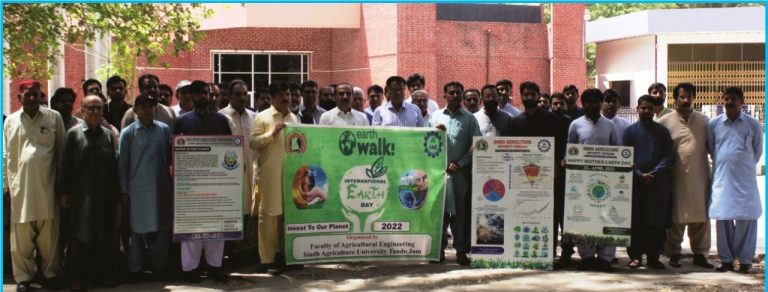
Water and soil experts express grave concern on discharge of sewerage and poisonous industrial effluents in the Indus River and the sea.
Tando Jam
The water and soil experts expressing grave concern on discharge of sewerage and poisonous industrial effluents in the Indus River and the sea, have called for taking drastic measures to stop it for saving the earth and the human lives. .
Speaking at a seminar on the occasion of World Earth Day organized by the Faculty of Agricultural Engineering, Sindh Agriculture University (SAU) on April 22, the water, and soil experts expressed concern over the effects of temperature, climate change, and non-seasonal rainfall.
They said that drainage and discharge of polluted water into the Indus River, deforestation, colonization of green fields, and the salinity to groundwater are considered dangerous for the earth and human health. “In order to protect the land, each person should plant two trees,” they added recommending equitable distribution of water and reusing of used domestic water.
SAU Vice Chancellor Prof. Dr. Fateh Marri said that the dangerous consequences of rising temperatures and climate change are beginning to emerge. “The wheat and mango production has declined this year, while the Indus Delta has been devastated due to freshwater shortages and neglect”, he said, adding that everyone must work together to protect the planet.
 Dr. Rasool Bux Mahar, Professor, US Pakistan Center for Advanced Studies in Water at Mehran University of Engineering and Technology, Jamshoro said that proper irrigation and suitable water use in the fields can save agricultural land from becoming saline or dry. He said that there is no habit of afforestation in people of the country, as a result of which we are facing environmental disturbances, and low rainfall.
Dr. Rasool Bux Mahar, Professor, US Pakistan Center for Advanced Studies in Water at Mehran University of Engineering and Technology, Jamshoro said that proper irrigation and suitable water use in the fields can save agricultural land from becoming saline or dry. He said that there is no habit of afforestation in people of the country, as a result of which we are facing environmental disturbances, and low rainfall.
Dr. Altaf Ali Sial, Dean, Faculty of Agricultural Engineering and a water expert, said that riverine forests, mangrove forests, Makhi and Khipro forests have been destroyed while we are using the resources ruthlessly.
He said that the discharge of sewerage water in the Indus River and the release of toxic water from factories had led to a sharp rise in arsenic and toxins, which were making people sick and destroying the land. He urged that federal, provincial governments, institutions and the general public should take responsibility for the protection of the land.
Dr. Abdul Ghafoor Siyal, Dr. Muneer Mangrio, Dr. Mashooq Talpur, and Amanullah Tunio also spoke on the occasion. Scientific Poster competition was also held on the occasion, in which Munawar Meghwar, Anis Memon, Inayatullah Katohar, Zahid Ali Channa, and Maryam Hina were awarded cash prize and certificates.
Later, an awareness rally was organized on the occasion of World Earth Day under the leadership of Vice Chancellor Dr. Fateh Marri. Dr. Altaf Siyal, a large number of teachers and students were present on the occasion. (PR)
_________________